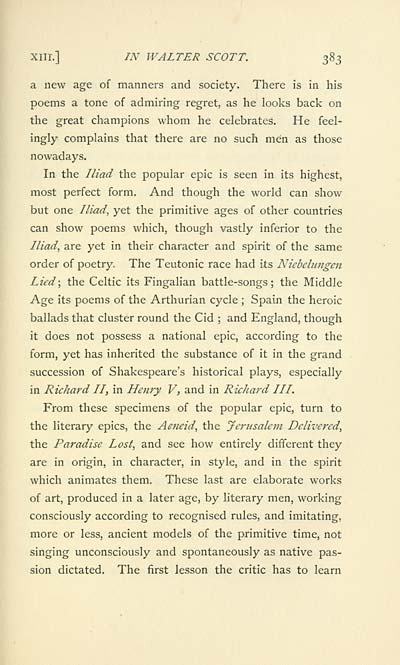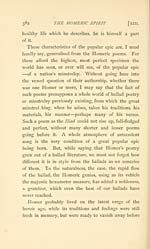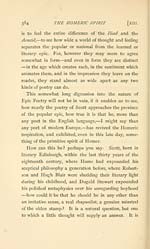Ossian Collection > Aspects of poetry
(399)
Download files
Complete book:
Individual page:
Thumbnail gallery: Grid view | List view

XIIL] in WALTER SCOTT. 383
a new age of manners and society. There is in his
poems a tone of admiring regret, as he looks back on
the great champions whom he celebrates. He feel-
ingly complains that there are no such men as those
nowadays.
In the Iliad the popular epic is seen in its highest,
most perfect form. And though the world can show
but one Iliad, yet the primitive ages of other countries
can show poems which, though vastly inferior to the
Iliad, are yet in their character and spirit of the same
order of poetry. The Teutonic race had its Niebebingen
Lied; the Celtic its Fingalian battle-songs; the Middle
Age its poems of the Arthurian cycle ; Spain the heroic
ballads that cluster round the Cid ; and England, though
it does not possess a national epic, according to the
form, yet has inherited the substance of it in the grand
succession of Shakespeare's historical plays, especially
in Richard II, in Henry V, and in Richard III.
From these specimens of the popular epic, turn to
the literary epics, the Aeneid, the Jerusalem Delivered,
the Paradise Lost, and see how entirely different they
are in origin, in character, in style, and in the spirit
which animates them. These last are elaborate works
of art, produced in a later age, by literary men, working
consciously according to recognised rules, and imitating,
more or less, ancient models of the primitive time, not
singing unconsciously and spontaneously as native pas-
sion dictated. The first lesson the critic has to learn
a new age of manners and society. There is in his
poems a tone of admiring regret, as he looks back on
the great champions whom he celebrates. He feel-
ingly complains that there are no such men as those
nowadays.
In the Iliad the popular epic is seen in its highest,
most perfect form. And though the world can show
but one Iliad, yet the primitive ages of other countries
can show poems which, though vastly inferior to the
Iliad, are yet in their character and spirit of the same
order of poetry. The Teutonic race had its Niebebingen
Lied; the Celtic its Fingalian battle-songs; the Middle
Age its poems of the Arthurian cycle ; Spain the heroic
ballads that cluster round the Cid ; and England, though
it does not possess a national epic, according to the
form, yet has inherited the substance of it in the grand
succession of Shakespeare's historical plays, especially
in Richard II, in Henry V, and in Richard III.
From these specimens of the popular epic, turn to
the literary epics, the Aeneid, the Jerusalem Delivered,
the Paradise Lost, and see how entirely different they
are in origin, in character, in style, and in the spirit
which animates them. These last are elaborate works
of art, produced in a later age, by literary men, working
consciously according to recognised rules, and imitating,
more or less, ancient models of the primitive time, not
singing unconsciously and spontaneously as native pas-
sion dictated. The first lesson the critic has to learn
Set display mode to: Large image | Transcription
Images and transcriptions on this page, including medium image downloads, may be used under the Creative Commons Attribution 4.0 International Licence unless otherwise stated. ![]()
| Early Gaelic Book Collections > Ossian Collection > Aspects of poetry > (399) |
|---|
| Permanent URL | https://digital.nls.uk/78390060 |
|---|
| Description | Selected books from the Ossian Collection of 327 volumes, originally assembled by J. Norman Methven of Perth. Different editions and translations of James MacPherson's epic poem 'Ossian', some with a map of the 'Kingdom of Connor'. Also secondary material relating to Ossianic poetry and the Ossian controversy. |
|---|
| Description | Selected items from five 'Special and Named Printed Collections'. Includes books in Gaelic and other Celtic languages, works about the Gaels, their languages, literature, culture and history. |
|---|

